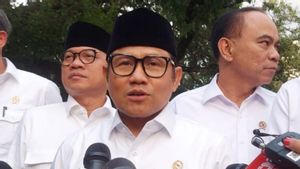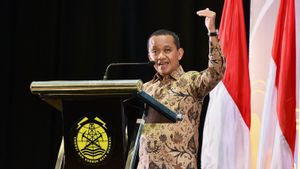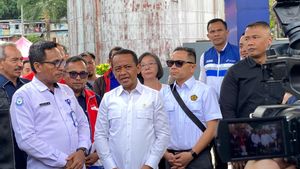JAKARTA - West Java will soon return to a new normal life in the midst of the COVID-19 outbreak. West Java Governor Ridwan Kamil stated that this new normality will be implemented on Monday, June 1.
"We will start (a new normal life) on Monday, June 1. From Wednesday to this week we will socialize," Ridwan said as quoted from the official website of the West Java Provincial Government, Thursday, May 28.
West Java is one of four provinces besides DKI Jakarta, West Sumatra, and Gorontalo that are preparing to enter a new normal order.
The former mayor of Bandung said that West Java is one of the areas that can carry out a new normal life order because it is considered capable of controlling the spread of this virus. Moreover, the number of virus transmission in the area he leads is around 1.09.
"In WHO standards, this figure is considered under control. The smaller the zero is better. We will focus on maintaining this for the next 14 days. We have one week for the ratio at one. could fall into the controlled category, "he said.
Ridwan also said that the level of vigilance in implementing this new normal would be different in each regency and city due to differences in regional zones.
He also emphasized that the new normality that will soon be implemented is not a form of easing health protocols but an adaptation step to face the outbreak of COVID-19.
"The new normality is not relaxation or leniency but rather adaptation. Therefore, standard health protocols remain valid even when public activities are opened," he said.
In this new normality, said Ridwan, all economic sectors such as markets, malls, factories and other commercial sectors will be opened. However, as a first step, they are required to make a statement of their ability to carry out the health protocol when the new normal is implemented, including being ready to receive sanctions if they do not comply with the applicable health protocol.
In addition, in welcoming this new normal, the West Java Provincial Government will also regulate school operational activities. Mainly, in maintaining physical distance according to health protocols.
Ridwan gave an example, if there are usually 40 students in one class, it will be arranged so that they can maintain a distance. "How is it still being studied while walking. If it is in a place of worship such as a mosque, it is easier because it can be carried out by keeping a safe distance," he said.
New school year scenarioWelcoming the new normality which will be implemented on June 1, the West Java Provincial Education Office will also prepare a health protocol to suppress the spread of this virus, especially for high school students and the equivalent.
According to the Head of the West Java Education Office, Dewi Kartika, although still waiting for a decision from the Task Force for the Acceleration of Handling COVID-19 regarding the reopening of schools, this protocol must still be made. Moreover, Minister of Education and Culture (Mendikbud) Nadiem Makarim has said that the new school year will begin in July.
"Minister Nadiem is expecting the first semester to start in July but the first time he enters school on what date is still waiting for information on the central COVID-19 Task Force," said Dewi.
The West Java Provincial Education Office is actually not that worried when high school students catch COVID-19. Because, according to data from the COVID-19 Acceleration Task Force, high school students are not among those who are susceptible to contracting this virus. However, what is of concern is when they have the potential to carry the virus to the more vulnerable people around them.
"They can be old teachers, parents at home, or travel companions when using public transportation. These high school kids are strong but they can be carriers of the virus. That's why this needs to be a concern," he said.
Thus, the health protocol for students, especially for high school students and the equivalent will be strict. However, there are several points that are likely to be adjusted, namely students' interactions at home, interactions on trips to school, and when in class with teachers and friends at school.
"We do not know that students interact at home with anyone, continue to go to school using public transportation to meet anyone. We do not know. This must be anticipated," said Dewi, adding that this health protocol will also be adjusted to the color of the regional zone.
In addition, this health protocol will also contain standards for school management if there are students or teachers who have contracted the virus.
In the future, Dewi hopes that the health protocol for students, especially at the high school level and the equivalent, will be completed soon so that it can be immediately disseminated to various districts and cities in West Java. He also hopes that the Ministry of Education and Culture will also immediately convey a decision regarding this new academic year.
"The Ministry of Education already has a plan A, plan B, plan C but it has not arrived at us (Disdik). God willing, this Friday is clear," he said.
The desire for a new normalThe preparation of several regions, such as West Java, to welcome this new normality began after President Joko Widodo visited a number of locations such as the HI Roundabout MRT Station and Summarecon Mall Bekasi to check the readiness of implementing health protocols.
I reviewed the readiness to implement the new order procedure at the MRT Station in Jakarta, this morning. Starting today, members of the TNI and Polri will be deployed to crowded spots in 4 provinces and 25 districts / cities to remind the public to apply health protocol discipline. pic.twitter.com/GVYYnFEV5m
- Joko Widodo (jokowi) May 26, 2020
During the visit, Jokowi emphasized that he wanted a new normal life in society to be fulfilled immediately. However, to achieve this, Jokowi is aware that the central and regional governments must reduce the reproduction rate (RO) to 1.
"We want to remain productive but safe with COVID, this is what we want. But in getting to that new order, we also look at figures and facts on the ground," Jokowi said during his visit to Summarecon Mall Bekasi, as shown on the Presidential Secretariat YouTube account, Tuesday, 26 May.
To achieve this new normality, the government has even issued a number of protocols through the Ministry of Health. One of them is the Decree of the Minister of Health numbered (KMK) Number HK.01.07 / MENKES / 328/2020 concerning Guidelines for the Prevention and Control of Covid-19 in Office and Industrial Workplaces in Support of Business Continuity in Pandemic Situations.
According to Gadjah Mada University sociologist Sunyoto Usman, not all people in society will be able to apply this rule. Primarily, those who live are hard laborers or rely on muscles such as construction workers.
Sunyoto said, they would find it very difficult to apply health rules such as always washing their hands and keeping their distance. Because, in their work they often carry out activities that are prohibited by these regulations.
Then, Sunyoto also considered traditional traders difficult to implement this policy. Because, they are accustomed to communicating with buyers directly regardless of distance. So, implementing the health protocol is considered quite difficult.
"For some other residents it is not easy to accept it, especially when their activities are felt subjectively not being disturbed by COVID-19 such as construction workers, motorbikes, traditional markets and so on," said Usman.
However, different things will happen to those who already have high awareness. They will be easy to adapt. This is because the regulation is considered very helpful for smoothing their business activities.
So that in order to avoid mistakes or the ineffectiveness of these regulations, the government must prepare steps to overcome them. One of them is by providing education for those who do not understand these rules because imposing sanctions is not the right solution.
This is because, reflecting on what has happened, the public seems not afraid of the sanctions given. Thus, it is very important to provide knowledge in order to increase awareness. "Do not rush to impose sanctions, they are often not effective. It is necessary to provide knowledge and awareness," said Usman.
Meanwhile, an epidemiologist from Australia's Griffith University, Dicky Budiman, said that this new normality is quite good on paper. However, the implementation is considered rushed. Given, the gap between phases between Large-Scale Social Restrictions (PSBB) and this new normality is too close.
"Ideally there is an evaluation between phases. Because there is a big possibility that there will be many obstacles in the field and interventions," he said.
Dicky also assessed that this actually could not be applied nationally or in all regions. Given, each province and island has different circumstances. In addition, the coverage for COVID-19 testing is still low. In addition, the quality of the tracing and the effectiveness of the isolation are questionable. "Even though these three are our main intervention and weapon in controlling COVID-19," he concluded.
The English, Chinese, Japanese, Arabic, and French versions are automatically generated by the AI. So there may still be inaccuracies in translating, please always see Indonesian as our main language. (system supported by DigitalSiber.id)













